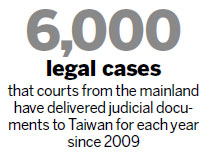Cross-Straits court ties can be improved
Updated: 2014-06-20 08:16
By Cao Yin (China Daily)
|
||||||||
The judicial efficiency of cross-Straits courts should be further improved under legal cooperation of the mainland and Taiwan, officials of the Supreme People's Court said on Thursday.
The cross-Straits courts signed the agreement on mutual judicial assistance in 2009, aiming to improve investigations, delivery of legal documents, approval of verdicts and transfer of compensation, according to a statement from the top court.
By May, 37,423 cases had been handled under the agreement, and the number is rising rapidly, said Sun Jungong, the top court's spokesman.
In 2009, Hangzhou Intermediate People's Court of Zhejiang province concluded a telecom fraud case involving 17 Taiwan defendants. The court took control of illicit money and transferred more than 2.3 million yuan ($369,000) to Taiwan victims.

Sun said that courts of the mainland have delivered judicial documents for about 6,000 legal cases to Taiwan each year since 2009. Taiwan had demanded more judicial assistance from the mainland over the past five years.
The mainland filed 2,976 applications last year requesting that Taiwan courts send legal documents, while the figure in 2010 was 85, according to statistics of the top court.
In 175 cases last year, the mainland asked Taiwan courts to investigate for evidence. Five years ago, there were eight such requests, the statistics show.
Sun said it is self-evident that mutual judicial assistance is necessary for both the mainland and Taiwan, adding that such cooperation can accelerate the process of handling cases.
He Zhonglin, director of the top court's office specializing in Taiwan cases, said more judicial materials have been successfully sent to litigants since the agreement took effect.
Previously, less than 10 percent of cases involving delivery of legal documents saw successful deliveries of the documents, "as addresses given by Taiwan litigants sometimes were unclear or even wrong", he said.
Last year, however, 67 percent of judicial documents were successfully delivered to Taiwan, He said.
However, the officials said that delivery procedures can be further streamlined, even if there are some differences between the legal systems of the mainland and Taiwan.
Now, a Taiwan court must turn in its application for delivery of judicial materials to the area's law affairs authority first, and then the mainland will send it to the province and the grassroots courts involved, said He.
"The current procedures have reduced efficiency of courts handling more Taiwan-related cases, such as in Xiamen and Jinmen," he added.
Yan Rongxia, judge of the Fuzhou Intermediate People's Court in Fujian, said her authority has sent at least three officers to handle delivery cases related to Taiwan, although only one is required under the current agreement.
He said, "In addition, Taiwan allows sending judicial documents with e-mail and questioning litigants via long-distance video call, which are not yet accepted in the mainland."
Contact the writer at caoyin@chinadaily.com.cn

 Congresswoman questions US 'pivot' strategy
Congresswoman questions US 'pivot' strategy
 Neil Bush: Continuing a father's legacy
Neil Bush: Continuing a father's legacy
 Beijing, Hanoi vow to act on friction
Beijing, Hanoi vow to act on friction
 Coalition to host forum over NYC school admissions bill
Coalition to host forum over NYC school admissions bill
 Chinese tycoon offers free lunch, cash to poor in NYC
Chinese tycoon offers free lunch, cash to poor in NYC
 NYC business professionals earn a salute
NYC business professionals earn a salute
 Chinese football fan at Maracanã Stadium
Chinese football fan at Maracanã Stadium
 High-level exchange
High-level exchange
Most Viewed
Editor's Picks

|

|

|

|

|

|
Today's Top News
'Expansion not in Chinese DNA'
Xi's ROK visit 'a milestone': US envoy
Chinese jeweler buys Hearts On Fire
Chinese stories, Hollywood thrills
Beijing, Hanoi vow to act on friction
Huawei gets insurance help in Europe
Wal-Mart to triple efforts on food safety
US captures Benghazi suspect in raid: Pentagon
US Weekly

|

|







